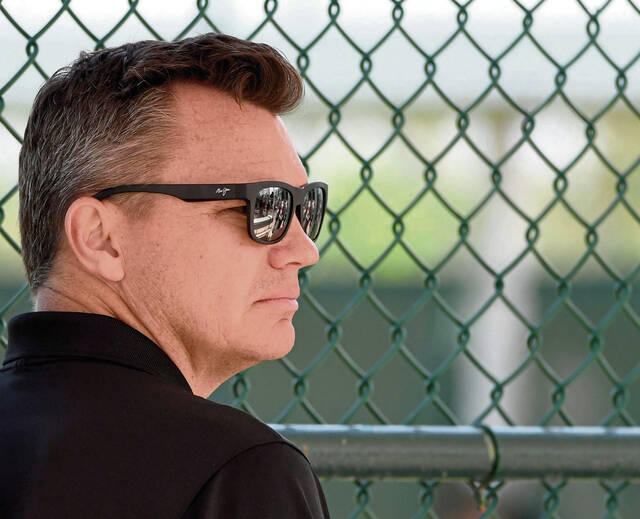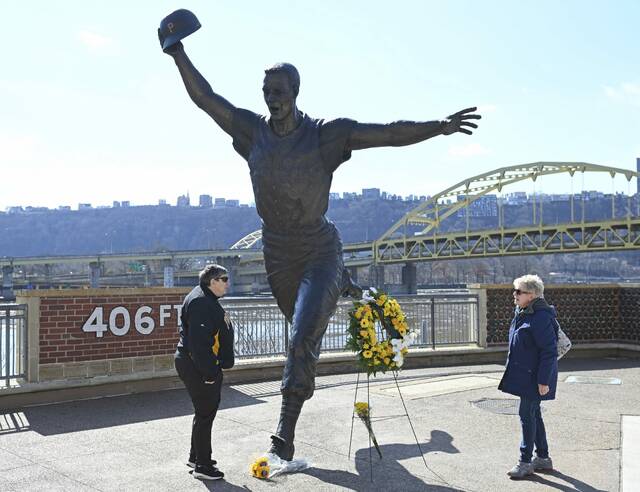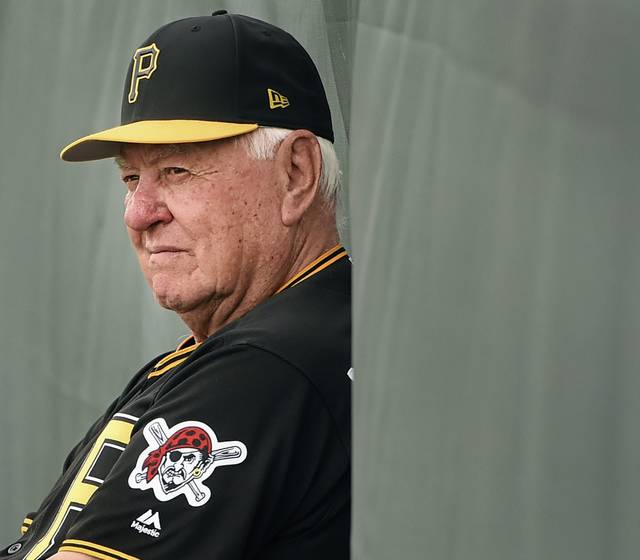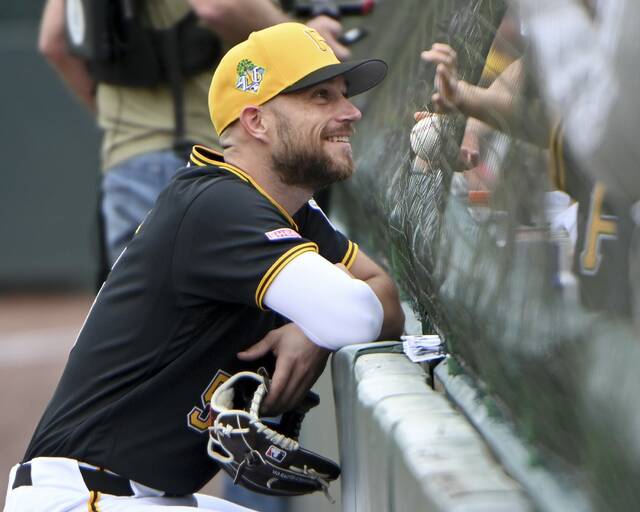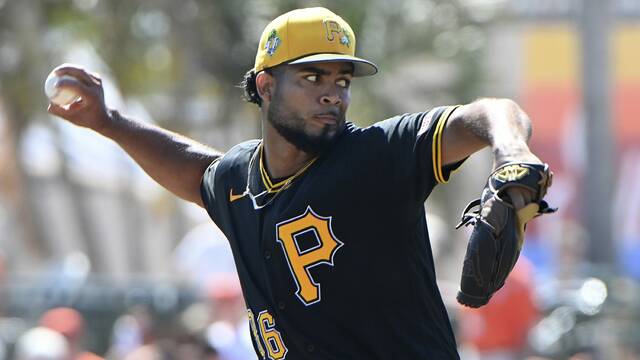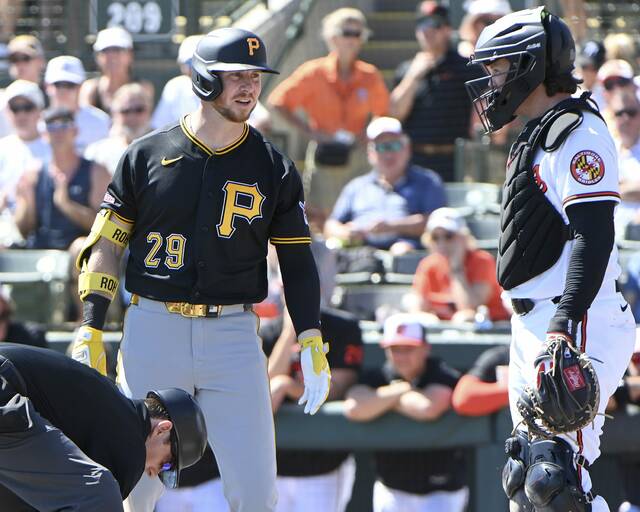Hours before the start of Major League Baseball’s first labor stoppage in 26 years, Ben Cherington was conducting a video conference call in an airport Wednesday while awaiting a flight to the Dominican Republic.
The Pittsburgh Pirates general manager speculated that the expiration of the collective bargaining agreement led to a November free-agent frenzy in which teams committed to $1.7 billion in guaranteed contracts with the lockout looming. The Pirates, meantime, pretty much broke even.
Their pre-lockout moves prompted two prescient questions:
First, do the Pirates have to win before they are willing to spend?
They are banking heavily that their investment in prospects, through the trades of All-Stars like Starling Marte, Josh Bell and Adam Frazier, Opening Day starters Joe Musgrove and Jameson Taillon and a Gold Glove winner in Jacob Stallings and the resulting high draft picks after three consecutive last-place finishes, will allow them to build a winner from within before adding prominent free agents.
“No is the simple answer,” Cherington said, “but the longer answer is we’re always looking at the total players that we have on the roster, in the system, how they’re projecting so we have some idea what the trend is and what it might look like if players progress at a reasonable rate over the next six months, 10 months, a year, two years — whatever the timeline is.
“As we see that starting to come together and giving us a better chance to win more games at the major league level, then absolutely it’ll make sense to think about managing our roster or player acquisition differently, when we see that coming. I think that we’re getting closer to that. We’re getting closer to that partly because we have more players in the system than we did two years ago. So, no, I don’t think you wait for winning. We also need to make decisions based on an informed estimate on when that talent is going to come together and jell together and develop together to get us close to it and be very clear on how we need to complement that group.”
The second question is one the Pirates should have their fingers crossed that a new CBA can help resolve: Do small-market teams have to lose to win, trading their assets and tanking to offset the game’s inequities?
Cherington cited how similar small-market teams that he personally admires — the Cleveland Guardians, Oakland A’s and Tampa Bay Rays — run their baseball operations to build consistent contenders.
“What I think stands out about those teams is they likely at one point did go through maybe a longer period of struggles but totally focused on getting to more winning and, once they did, those teams have found a way to sustain that fairly consistently,” Cherington said. “They might have smaller dips or downturns but once they’ve sort of established that base, they’ve been able to make decisions they give them a chance to sustain that over time. That’s what we want to do, period.
“We want to get to winning and we want to figure out a way to sustain that. That doesn’t mean it’s going to be at the same level every single year after you get to winning, but if we do our jobs really well, that’s what I believe we can do. Right now, yeah, it’s about talent accumulation and doing all the little things better that we need to do to get to that. Get to that as soon as we possibly can and then find a way to sustain that.”
While the lockout prevents teams from making any major league roster moves, the Pirates released a statement Thursday morning promising to continue working with their minor leaguers: “We remain laser focused on continuing to execute our plan of developing this next wave of talent that will fuel the future of our success in Pittsburgh.”
That’s why Cherington was accompanied by Pirates manager Derek Shelton on the trip to the Dominican Republic academy, where the team was conducting a camp for prospects. They also will hold a camp for pitching prospects this month at Pirates City in Bradenton, Fla.
As Cherington deals with present problems, he’s keeping an eye on the future. The Pirates have invested heavily in developing their draft picks and international signings, as well as the prospects landed in trades.
“As we look toward spring training and imagine what our spring training roster will look like, that’s exciting to me,” Cherington said, “because there’s going to be a lot of players at spring training, whether they are in the big leagues in 2022 or not are getting closer and have a chance to be a part of what we’re building.”
Meantime, Cherington stuck to a tight budget in the moves he made before the lockout. The $14.75 million spent in avoiding arbitration with shortstop Kevin Newman and outfielder Ben Gamel and signing free agents in left-hander Jose Quintana, first baseman Yoshi Tsutsugo and catcher Roberto Perez was offset by the $14 million in projected arbitration totals saved by trading catcher Jacob Stallings and not tendering contract offers to first baseman Colin Moran and pitchers Steven Brault, Chad Kuhl and Chasen Shreve, who became free agents.
While Cherington wasn’t in position to make promises about the future, Pirates fans can breathe a sigh of relief that he didn’t trade anyone else before the lockout, most notably All-Star center fielder Bryan Reynolds, a finalist for Gold Glove and Silver Slugger awards.
“Trades will happen,” Cherington said. “The calculation on the trade sometimes changes over time, as your team builds. It doesn’t mean they stop. If you look at teams around the league that might be in similar markets who are succeeding right now, winning at a strong level at the major league level, they’re still making trades. But the calculus behind those trades might change over time. I would expect that would happen to us, too.”
Cherington attempted to put a positive spin while being caught between a total teardown at the major league level and a bottom-up rebuild of the Pirates’ minor league system. Trading a Gold Glove catcher in Stallings for three prospects hurts the former but boosts the latter, so signing a two-time Gold Glove catcher in Perez serves as a stopgap.
That could require more trades, including Reynolds if he isn’t willing to sign an extension. The Pirates have dealt with the backlash of a fan base that hasn’t watched a player start and finish his career with the organization since Hall of Famer Willie Stargell, who died the day PNC Park opened in 2001.
Cherington knows the constant turnover is a crisis he must manage, perhaps by starting with finding ways to extend Reynolds and third baseman Ke’Bryan Hayes as building blocks for the Pirates.
“Maybe it’s just the definition of long-term that changes over time,” Cherington said. “I know I’ve said this before but I was a fan way before I had this job. I remember following teams in the ‘80s, yeah rosters were managed differently and it was more common that you get attached to a single player for a longer period of time. It still happens.
“It still can happen in Pittsburgh, too, and I hope it does, personally, with some players. But, yeah, over time there’s going to be changes. Again, look at teams that are successful in situations like ours and there’s quite a bit of change on those rosters fairly regularly. You can pick your spots and sometimes there can be a player that can be there for a long time. We certainly hope that’s the case here.”


